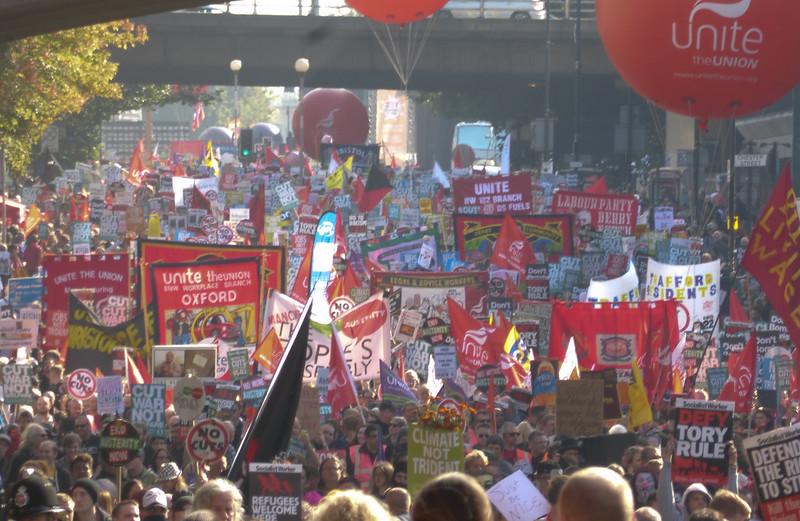A number of key unions have seen seismic shifts to the left in recent months, as workers turn to the industrial front for action. To beat the bosses, the left needs a strategy for united action, as part of the struggle for workers’ power.
“When the time is ripe things will move there with enormous speed and energy, but it may take a while till that point is reached.” Frederick Engels
Over the last six months important changes have taken place within the trade unions.
There have been shifts to the left, not least in the largest public sector union, Unison. There have also been signs of increased industrial struggles, with strikes or the threat of strikes involving rail workers, scaffolders, civil servants, bin workers, local authority workers, lecturers, and others. Unite is involved in more industrial disputes – over 50 – than at any time in its history.
These are clearly important changes, so what does this all mean?
An interesting article appeared recently in labourlist.org entitled ‘New Unionism: Radicalism is sweeping through the trade union movement’ by left-wing Labour MP, John McDonnell. In it he talks of “change in the air”, and describes “a wave of radical New Unionism”.
‘New Unionism’ was the name given to the industrial upsurge in the 1890s in Britain. This marked a transformation, and saw the creation of mass trade unions of unskilled workers – sections formerly considered as impossible to organise.
In this current period of instability that has opened up, these shifts to the left are an indication that significant changes are close at hand.
Given the decades-long ebb in the class struggle and the decline of trade union membership and power, these events indicate the potential for a qualitative change in the situation. The trade unions can once again become the main focus for resistance and fight back for the working class.
Brilliant article from @johnmcdonnellMP "New Unionism has arrived – and in the nick of time for many working-class people."@johnmcdonnellMP says a new wave of radicalism is sweeping through the trade union movement: https://t.co/5vAeMDZEQo
— #TimeForRealChange (@tfrc_unison) December 30, 2021
Capitulation
Over a long period of time, the bulk of the trade union leadership has acted as a colossal brake on the movement of the working class.
“The full-time apparatus in some unions are seen as having an iron grip on the levers of power within the organisation, stifling democratic decision making by lay members and restraining their members’ willingness to mobilise and campaign”, wrote John McDonnell.
 Rising inflation tends to be accompanied by rising levels of strike action, as workers attempt to claw back what they have lost / Image: Socialist Appeal
Rising inflation tends to be accompanied by rising levels of strike action, as workers attempt to claw back what they have lost / Image: Socialist Appeal
The right-wing union leaders did everything to dampen and dissipate any attempt to struggle. They laid the blame on the members for lack of a fight. ‘We can only go as far as the members are prepared to go’, they would cynically say.
The right-wing leadership of Unison was typical in this regard, being heavily embroiled in class collaboration with employers and government.
This policy of open capitulation and retreat has had disastrous effects, resulting in the biggest cut in real wages in the last ten years in any decade since Napoleonic times. Privatisation and casualisation proceeded apace, resulting in the widespread destruction of workers’ terms and conditions.
Of course, there were honourable exceptions to this abject capitulation, such as the left-led unions like the PCS and RMT, and a few others.
But now the whole terrain is changing. Once considered a very stable country, Britain has become extremely unstable.
Seismic shifts
In fact, over the recent period, we have witnessed a series of earthquakes and shocks.
These include, for instance, the dramatic rise of the Scottish independence movement and the collapse of Scottish Labour; the rise and fall of Corbynism; the Brexit vote; the decline of Unionism in the north of Ireland; and a generalised crisis of the regime, compounded by the actions of the Johnson government.
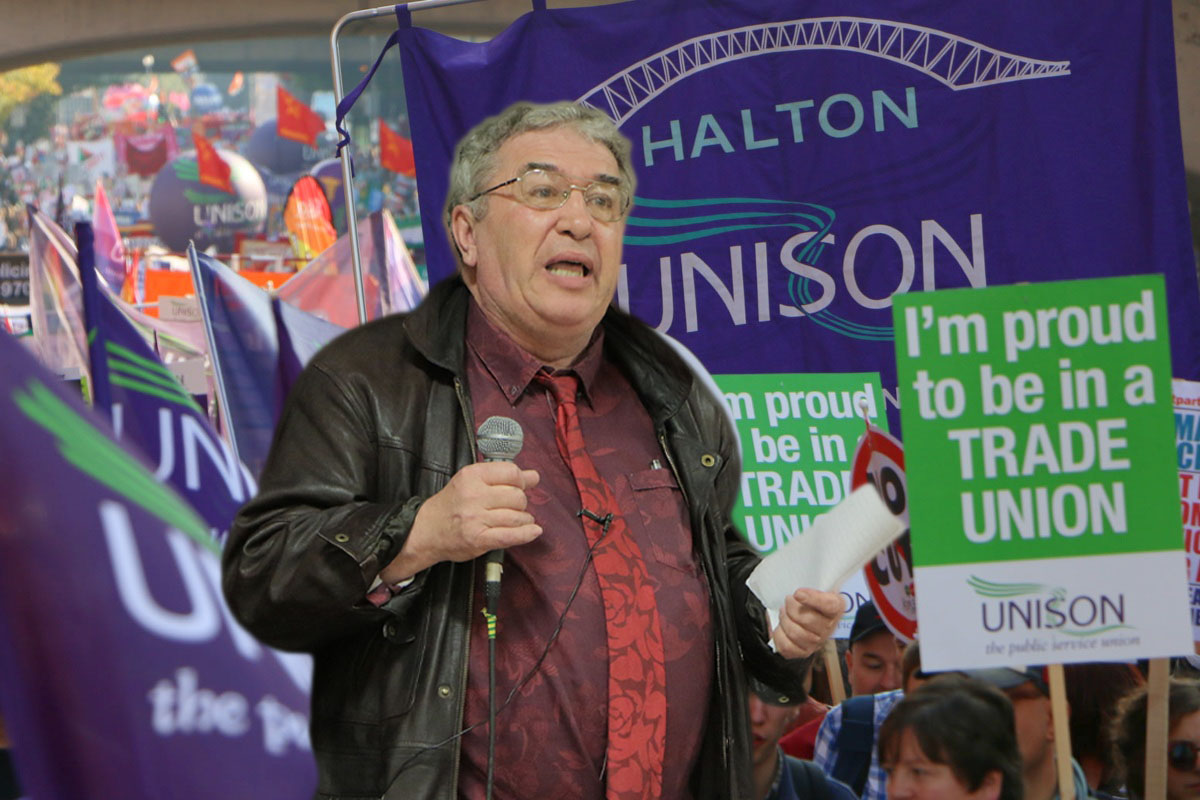 In the current period of instability that has opened up, the shifts to the left in the unions are an indication that significant changes are close at hand / Image: Socialist Appeal
In the current period of instability that has opened up, the shifts to the left in the unions are an indication that significant changes are close at hand / Image: Socialist Appeal
All these phenomena have common roots. At bottom they are a reflection of the deepening crisis and impasse of British capitalism, which has degenerated into a third-rate power on the fringes of Europe, governed by a gang of incompetent upstarts, liars, and rogues.
The more far-sighted strategists of the ruling class are deeply alarmed at the situation. In the past, they could rely upon the Tory Party and right-wing trade union leaders to guarantee their interests. These were important levers with which to control the situation and maintain a degree of stability. But this is no longer the case.
The Establishment’s control over the Tory Party has slipped from their grasp, especially under the maverick Boris Johnson. Just as serious is their loss of control over key trade unions.
The 1.4 million-strong Unison, the previous bastion of the right-wing, has shifted to the left, with the election of a left NEC and President. While the Establishment’s candidate for the Unite general secretary, Gerrard Coyne, was heavily defeated, and the subsequent victory of Sharon Graham has pushed the union further to the left.
This growing turmoil could never have happened at a worse time for the ruling class. The anger and bitterness in society is reaching explosive levels. The working class is facing a dramatic fall in living standards in the months ahead, with prices rising and energy bills going to double in April. This is described by the Resolution Foundation as a “cost of living catastrophe”.
“The overall picture is likely to be one of prices surging and pay packets stagnating. In fact, real wages have already started falling, and are set to go into next Christmas barely higher than they are now,” states the Foundation.
Periods of rising inflation have tended to be accompanied by rising levels of strike action, as workers attempt to claw back what they have lost in terms of the purchasing power of their wages. The ruling class therefore finds itself sitting on top of a volcano that is ready to erupt.
Discontent
Previously, the widespread anger and radicalisation had found an expression in the emergence of Corbyn as leader of the Labour Party. This was a political channel through which the working class found a way of expressing its desire for change.
But now with Starmer returning Labour back to Blairism, the political front is blocked. As a result, the working class is turning towards the trade union front.
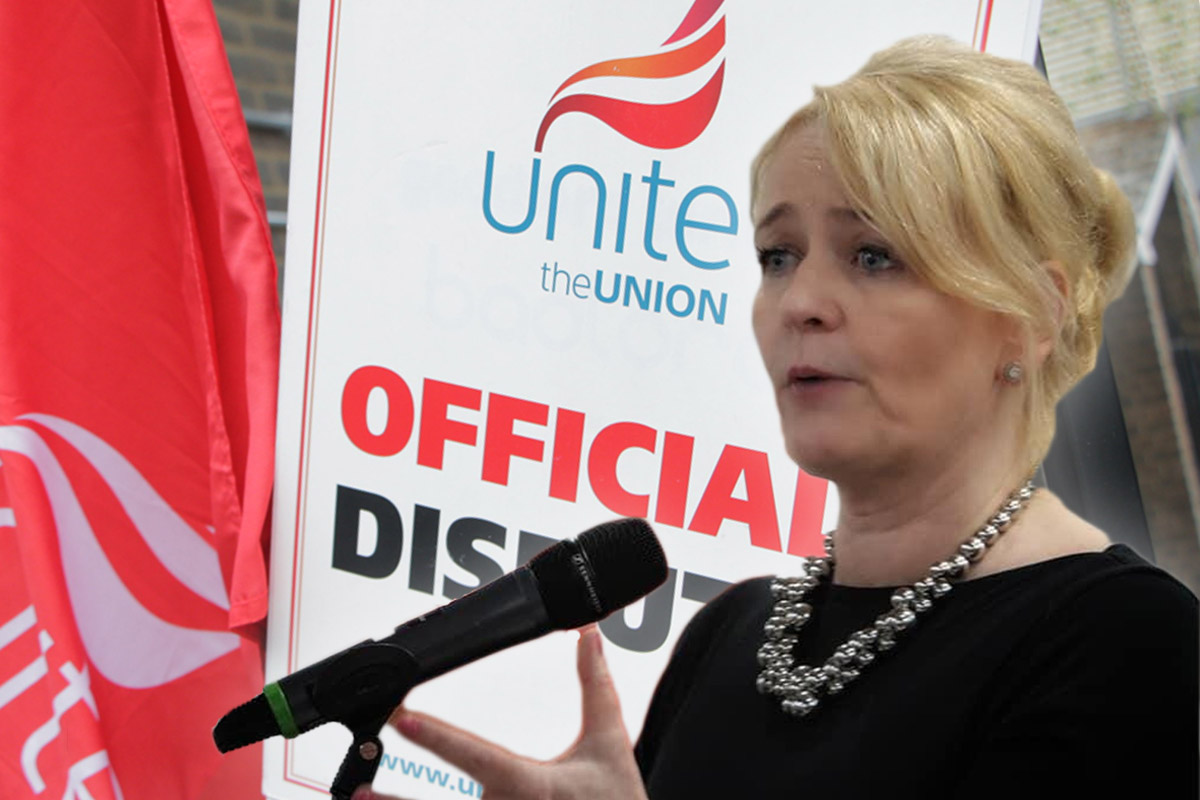 The mood of anger in the union ranks was reflected in the election of Sharon Graham as the new general secretary of Unite, who promised a revival of workplace militancy / Image: Socialist Appeal
The mood of anger in the union ranks was reflected in the election of Sharon Graham as the new general secretary of Unite, who promised a revival of workplace militancy / Image: Socialist Appeal
This is how we explain the highly significant election of a new Left leadership of Unison, the first time in 20 years. The Left would also have won the general secretary position, but for the sectarianism of the Socialist Party and those who supported a rival ‘left’ candidate, which split the vote, allowing in the right-wing candidate.
The mood of anger in the ranks was also reflected in the election of Sharon Graham as the new general secretary of Unite, who promised a revival of workplace militancy.
“What are we trying to achieve? What are we facing? And what do we need to make change?”, asked Sharon in a recent article.
“Speaking plainly, it is time to face facts. There is no Westminster hero coming to save us. We must do it ourselves, before it is too late. Specifically, we must build popular, working-class power.” (Tribune, 30/12/21)
In this, Sharon Graham has championed the need to build up union support from the workplaces, linking reps across the combines, and coordinating industrial action, together with other unions. This is potentially a big step forward.
With the Left controlling the NEC in Unison, and Paul Holmes as President, united and coordinated action is possible not only between the two biggest unions in Britain, Unite and Unison, but across the movement, as advocated by the PCS leadership over the last two decades.
This shake-up in the trade unions is part of the same process that propelled Corbynism to the top of the Labour Party, and is now being expressed on the trade union front. They are both part of the same phenomenon: the growing discontent and anger in society.
It is also a confirmation of our perspective that the working class, blocked on the political front, will swing to the industrial plane.
Learning the lessons
Reformists tend to swing from elation to despair. When Corbyn was riding high there was a mood of confidence that a government that defended the interests of the working class was around the corner. Once Corbyn was removed a mood of deep depression gripped layers of the left. But our task is neither to laugh nor to cry, but to understand.
The defeat of Corbyn was not the end of the story. What had propelled Corbyn to the top, the anger of the working class, had not gone away; it had simply been stifled. It was bound to find another expression.
And as John McDonnell explains in his article, “Each victory over recalcitrant trade union bureaucrats or exploitative employers not only heralds the emergence of New Unionism, but inspires its dynamic spread.”
This means the reemergence of the class struggle on a level that we have not seen for decades. This is extremely promising but we also need to learn some lessons.
A vital lesson drawn by the new Unison Left is that it is not possible to appease the union’s right wing. This is a lesson drawn from the negative experience of Corbynism in the Labour Party, where the left – for fear of upsetting the right – refused to take the battle to the end.
Class collaboration
The right-wing within the trade unions – and the Labour Party – reflect the pressures and interests of the ruling class. Their philosophy is open class collaboration, an attempt to reconcile the irreconcilable class contradictions in society. Their model is ‘business unionism’, to create a cosy relationship with the bosses.
The lack of fighting spirit permeates the right-wing trade union leaders. This is because they see no alternative to capitalism, and view their role as working within the system.
 With fuel bills soaring, benefit cuts and tax rises, workers in 2022 will face a “cost of living storm”. But instead of leading a militant campaign of strike action to fightback, TUC leaders advocate class collaboration policies / Image: War on Want, Flickr
With fuel bills soaring, benefit cuts and tax rises, workers in 2022 will face a “cost of living storm”. But instead of leading a militant campaign of strike action to fightback, TUC leaders advocate class collaboration policies / Image: War on Want, Flickr
The General Council of the TUC, as the elected leadership of the trade unions, should in theory function as a general staff of the labour movement in the struggle against the bosses. Instead it seeks agreements and cooperation with the Tory government.
This was expressed most recently in the TUC’s demand that the Tory government establish a ‘National Council for Reconstruction and Recovery’, together with the employers and the trade unions.
Class collaboration has a long history going back to the middle of the 19th century, with Model Unionism following the defeat of Chartism. This was the period of imperialist expansion and the growth of super-profits, which were used by the capitalists to buy off sections of the working class. It is viewed by the right-wing as a recipe for ‘industrial peace’, and a panacea for all ills.
In her New Year’s message, Francis O’Grady, the general secretary of the TUC, underlined this view by urging Tory ministers to work with unions to develop a “long-term economic plan”, bringing together worker and employer representatives.
However, at the same time the TUC warned that families were “bracing themselves for a cost of living storm in 2022”, with fuel bills soaring, recent benefits cuts biting, and taxes set to rise.
But rather than lead a militant campaign of strike action to push up wages and take on the bosses, the TUC leaders instead advocate class collaboration. The left unions, such as the PCS, RMT, FBU and others, in recent years stood out against this approach, but they were largely isolated.
Now with developments in Unison and Unite, and strikes picking up, things are changing. To win her election as general secretary, Sharon Graham articulated this radicalised mood. “We must continue to build that confidence, and to show workers that as leaders we stand with them – not with the boss or the politician,” she said.
In a very positive move, she has come out in favour of closer union collaboration, which raises the possibility of united front action. “Wherever coordination with other unions is required, I will make the calls to try and help that happen. The ground is there for us to build on.”
“For me, this is what real change within the trade unions looks like: building the power to take action, again and again. This is a real fighting strategy,” she explained.
Confidence
Unfortunately, however, even some of the left within the trade unions, given their reformist outlook – i.e. their lack of confidence that society can be radically changed – are not totally free from class collaboration.
Such lefts have adapted for so long to past defeats and setbacks that they lack confidence in the workers to struggle. They cannot see the real mood that has been building up from below, a mood which has simply lacked a point of reference for it to express itself.
This lack of confidence has even seeped down into the union’s lay activists, many of whom have lost faith in the workers they were elected to represent.
It is true that workers are not always and everywhere pushing for strike action, especially when they know the battle will be hard. Taking strike action is the last resort. What is required here is a perspective.
Even if today layers of the working class are not yet ready to embark on strike activity, as Marxists we understand that the present crisis of capitalism is going to push even the most moderate of workers towards militant action.
Generally speaking, workers look to their leaders for guidance, and when this is lacking, it serves to spread despondency and apathy. It demonstrates the fact that class conscious leadership is crucial at all levels.
A Marxist leadership of the trade unions would prepare the ground for battle, raising the fighting spirit at each step, and putting themselves on the line. This would serve to inspire confidence and sweep away any doubts and difficulties.
Such a leadership would expose not only the bosses, but also the capitalist system as a whole, using each opportunity to pose the socialist alternative. In the words of Lenin, they would be “tribunes of the people”.
Prepare for battle
In this epoch of crisis and the death agony of capitalism, there are great challenges facing the working class. It would be a grave mistake to think that it can be ‘business as usual’, or to follow how things operated in the past.
Given the severity of the crisis, it will require the mobilisation of the whole movement to stop this bosses’ offensive in its tracks. However, while individual battles can be won, in order to stop cuts and privatisation overall, action must be generalised and co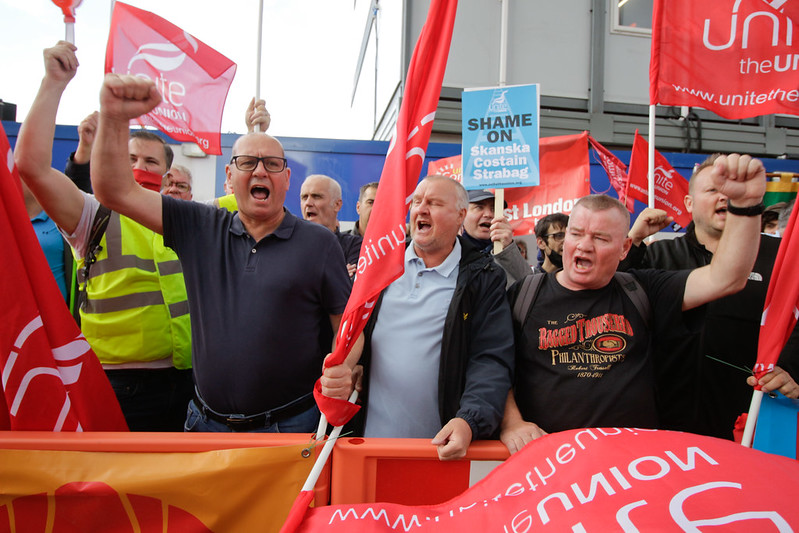 In this epoch of crisis and the death agony of capitalism, there are great challenges facing the working class. It would be a grave mistake to think that it can be ‘business as usual’, or to follow how things operated in the past / Image: Steve Eason, Flickrordinated.
In this epoch of crisis and the death agony of capitalism, there are great challenges facing the working class. It would be a grave mistake to think that it can be ‘business as usual’, or to follow how things operated in the past / Image: Steve Eason, Flickrordinated.
When capitalism was in its heyday, it could afford to grant reforms and therefore strike action could quite quickly lead to winning important concessions from the bosses. But that is not the situation today.
It is true that given the present supply chain problems, employers in some sectors are presently being forced to pay higher wages – such as in the case of the truck drivers – due to the shortage of labour. Yodel, the delivery firm, for example, agreed to raise some drivers’ pay by almost 20% – but only after they were threatened with strike action.
Obviously, workers should take advantage of this situation where possible. But this is more the exception than the rule. Millions of workers, especially the low-paid, face wage cuts, and their anger is growing. It is this pressure that is feeding its way into the trade unions.
The shifts to the left we have seen in one union after another are an indication that after a long period of passivity, we are now witnessing the first stretching of the muscles. The sleeping giant of the working class is beginning to stir.
Up until now, however, there was no point of reference for this growing discontent. Initially there were high hopes in the Corbyn movement, but that has come to an end. All eyes therefore are presently on the trade union front, where there are hopes that the new Left leaders will deliver.
Unfortunately, what is lacking is a perspective of where things are heading, and the drawing of the necessary conclusions.
As Karl Marx said about the trade unions at the founding of the First International in 1864: “One element of success they possess – numbers. But numbers weigh only in the balance if united by combination and led by knowledge.”
However, ‘knowledge’ or theory has always been a weak point of the British labour movement, which has instead relied on pragmatism and ‘common sense’.
Guide to action
What is required is a clear perspective. The highest theory for the working class is Marxism, which is an essential guide to action and perspectives.
As Marxists, we understand that without the struggle for day-to-day reforms, there can be no struggle to change society, which is the only real solution to the problems. That is why we must be at the forefront of fighting to improve the lot of the working class. “Not a minute on the day, not a penny off the pay”, to use the words of A.J. Cook, the past Miners’ Federation leader.
However, we also understand the limits imposed by capitalism. Every concession won by the working class with one hand, the capitalists will eventually seek to take back with the other.
Does that mean that to fight for reforms is pointless?
On the contrary! The class struggle is a struggle of living forces, and it is this that determines the outcome. It is precisely through the class struggle that workers learn from their own experience, through victories and defeats. It is through this school of hard knocks that consciousness is raised.
A trade union leader must be like a good general in war-time, but in the class war. They must have clear tactics, but also have a fully worked-out strategy.
“A Marxist trade union leader must not only grasp the general tendencies of capitalism, but also analyse the specific features of the situation, the conjuncture, the local conditions – the psychological element included – in order to propose a position of struggle, of watchful waiting, or of retreat,” explained Trotsky.
He added that, “It is only on the basis of this practical activity, intimately linked with the experience of the great mass, that the trade union leader is able to lay bare the general tendencies of decomposing capitalism and to educate the workers for the revolution.” (Trotsky, The Spanish Revolution, 1931-39, p.293)
As Trotsky explained, the role of a Marxist trade unionist should be to raise the level of understanding of the workers and to explain the forces that confront them. Marxism, otherwise known as ‘scientific socialism’, provides this class understanding.
Workers’ power
Sharon Graham has correctly said that through our unions “we must build popular, working-class power”. She has linked this to the importance of internationalism: “And we can’t do that without international trade unionism, without international struggle”.
The task facing us is the transformation of the trade unions into fighting organisations that challenge the domination of capital. That is the fight for ‘workers’ power’.
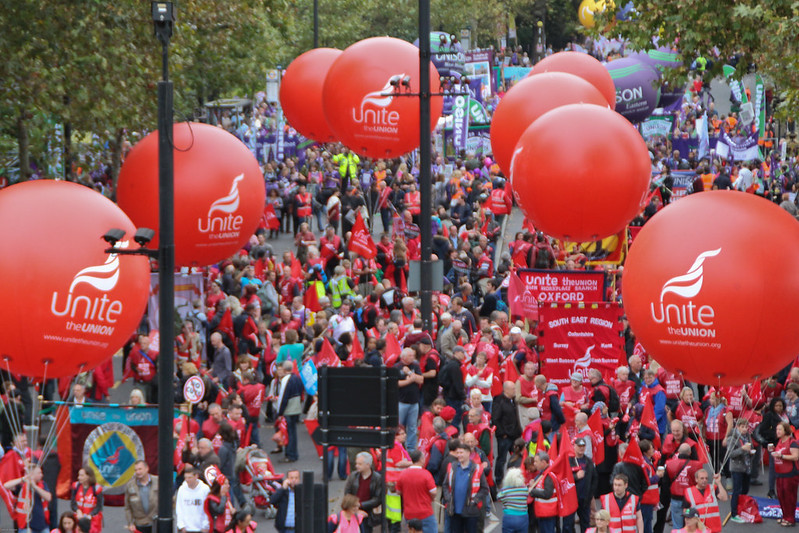 The task facing us is the transformation of the trade unions into fighting organisations that challenge the domination of capital. That is the fight for ‘workers’ power’ / Image: Steve Eason, Flickr
The task facing us is the transformation of the trade unions into fighting organisations that challenge the domination of capital. That is the fight for ‘workers’ power’ / Image: Steve Eason, Flickr
In order to build militant trade unions they need the maximum democracy, with the full participation of members, and the full accountability of full-time officials and union leaderships.
This also means the building up of democratic broad-left organisations in every union. As the saying goes, the price of our democratic rights is eternal vigilance. That is why the battle to defeat the right must be carried through to the end.
Sharon went on to list the challenges facing the working class: global climate catastrophe, mass automation of jobs, new waves of austerity, and emboldened mega employers.
Every one of these challenges is rooted in the crisis of capitalism, in Britain and internationally. The solution strikes at the very root of capitalist ownership and the fight over who is to control industry. To use Sharon Graham’s words, this is the essence of ‘working-class power’.
Struggle for socialism
This means that the struggle over day-to-day problems must be linked in a transitional manner to the public ownership of the major monopolies, banks and insurance companies, under democratic workers’ control and management. This revolutionary aspiration was, and in many cases remains, enshrined in the constitutions of the trade unions.
Only the overthrow of capitalism can offer a way forward for the working class. New Unionism led to the creation of the Labour Party and the ‘Great Unrest’ prior to the First World War. The new period we have entered will also set the scene for revolutionary convulsions in Britain as elsewhere.
The shift to the left in a number of important trade unions in Britain is a harbinger of what is to come. A new generation of activists will come to the fore seeking to change society, and in so doing they will fight to take back control of the trade unions, organisations which were built by the working class to fight the bosses.
The conditions are now emerging where the old right-wing trade union leadership can be removed in preparation for a new period of class struggle. In this way the trade unions will be able to step up to the mark and play an active part in fighting for socialism and the overthrow of capitalism.

